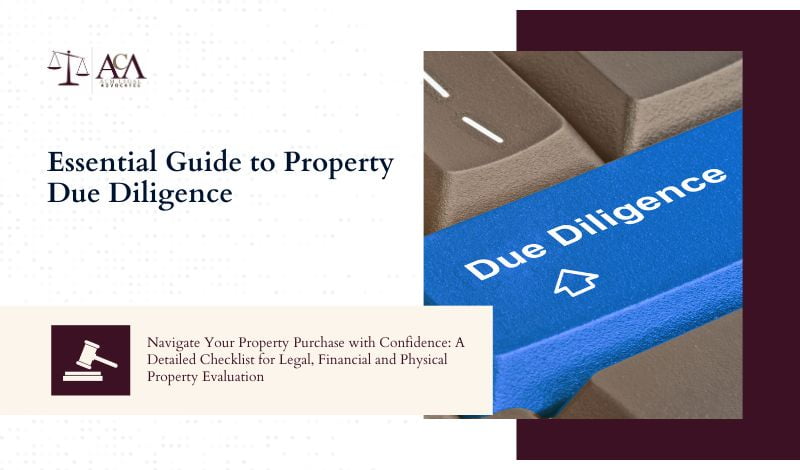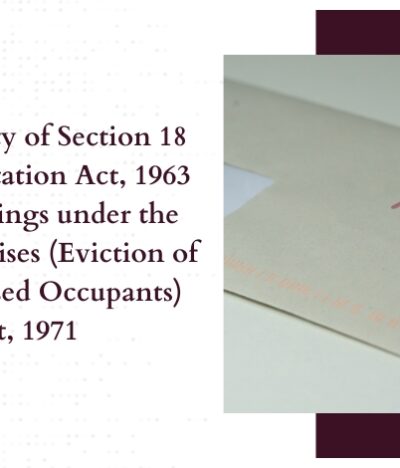Have you ever wondered what it takes to confidently invest in or purchase a property without facing unexpected surprises down the line? The key lies in a thorough property due diligence checklist.
A property due diligence checklist is a tool that allows anyone investing in or purchasing property to thoroughly examine all aspects of the property, including legal documentation, physical condition and financial viability.
What is Due Diligence for Property?
Property due diligence is like doing your homework before buying a property. It’s about making sure everything is in order – legally, financially and physically.
A property due diligence checklist is a must-have tool while purchasing a property in India. For example, if you’re buying an apartment, you should check if the builder has obtained all necessary approvals from municipal authorities and if the building adheres to the approved plans. Similarly, understanding the market trends in the area and future development plans can give insights into the property’s long-term financial potential.
Property Due Diligence Checklist
Below is a detailed checklist you must keep handy while conducting property due diligence.
1. Legal Verification
Oversights in legal verification such as overlooking encumbrances like liens or unpaid dues, ignoring compliance with local regulations, neglecting necessary construction approvals and inadequately scrutinizing legal documents can lead to significant issues in property transactions. Proper legal verification helps in avoiding such pitfalls, ensuring a legally sound property purchase.
a. Title Deed Verification
Confirm the authenticity of the title deed, ensuring the seller legally owns the property.
b. Encumbrance Certificate
Check for any existing legal liabilities or mortgages on the property.
c. Land Use Verification
Verify the land use zone under the local municipal records.
d. Approval and Permits
Ensure all necessary government and regulatory approvals, including building, environmental and health.
e. Property History
Investigate the property’s history for any disputes or irregularities.
f. Succession Certificate (if applicable)
For inherited properties, ensure a clear succession certificate.
2. Physical Inspection
Physical inspection in property due diligence involves a detailed examination of the property’s structure and condition to identify potential issues, ensuring quality and safety. To uncover hidden defects and ensure thoroughness, it’s advisable to engage professional inspectors.
Following this step will avoid future expenses and ensure the property meets the buyer’s expectations.
a. Structural Integrity
Evaluate the strength and condition of the building structure.
b. Utility Inspection
Check the status of essential utilities like water, electricity, sewage systems, gas and internet connectivity.
c. Property Age and Condition
Assess the age of the property and any wear and tear.
d. Pest Inspection
Ensure the property is free from pest infestations.
e. Natural Disaster Vulnerability
Assess the property’s vulnerability to natural disasters like floods or earthquakes.
f. Surrounding Infrastructure
Evaluate the condition of surrounding infrastructure, including roads, public transport, etc.
3. Financial Assessment
The financial evaluation stands as an important component of the property due diligence checklist. This stage involves a comprehensive analysis of various financial factors which will enable investors to assess not just the current value but also the long-term sustainability and profitability of the property investment.
a. Market Value Analysis
Compare the property price with similar properties in the locality.
b. Tax Records
Ensure all property taxes are up to date.
c. Hidden Costs
Check for any hidden costs, including maintenance fees, utility deposits or unpaid bills.
d. Insurance Costs
Estimate the cost of property insurance.
e. Investment Return Analysis
Evaluate potential returns on investment, including rental income prospects.
4. Regulatory Compliance
Regulatory compliance ensures adherence to local zoning laws, building codes and environmental regulations. The importance of compliance cannot be overstated, as non-compliance can lead to legal actions, fines, compromised safety, reduced property value, difficulty in securing financing and challenges in selling or leasing.
a. Zoning Laws
Confirm the property complies with local zoning laws and regulations.
b. Environmental Regulations
Ensure compliance with environmental standards.
c. Building Regulations
Verify that the property adheres to local building codes and safety standards.
d. Future Development Constraints
Understand any upcoming development plans or restrictions in the area that may affect the property.
5. Community and Neighbourhood Assessment
The community and neighbourhood dynamics form an essential part of the property due diligence checklist. By analyzing these factors, potential buyers can gauge whether the community aligns with their personal and familial needs, ensuring a harmonious and fulfilling living experience.
Factors like the quality of local schools, crime rates, future development plans and the overall reputation of the neighbourhood influence both the current and future value of a property. A thriving, well-maintained community typically sees higher property appreciation.
Neighborhood Demographics
This involves analyzing the population characteristics of the neighbourhood, including aspects like age distribution, family sizes, income levels and cultural diversity and checking if it aligns with your lifestyle preferences and future plans.
For instance, neighbourhoods with a growing population of young families might indicate a demand for larger homes and could lead to increased property values
a. Local Amenities
Evaluate proximity to amenities like schools, hospitals, shopping centres and parks.
b. Safety and Crime Rates
Check the local crime rates and overall safety of the area.
c. Noise and Air Quality
Understand any upcoming development plans or restrictions in the area that may affect the property.
Frequently Asked Questions
1. What exactly does due diligence mean in the context of property?
Due diligence in property is like doing a thorough background check. It means investigating every detail of a property before you buy or invest. This includes checking legal documents, inspecting the property physically and making sure the financial aspects add up. It’s about making sure there are no surprises after you’ve made the purchase.
2. What makes a due diligence checklist essential in property dealings?
A due diligence checklist is your roadmap when buying property. It ensures you don’t miss anything important. This checklist guides you through each step from legal checks to property inspections. It’s a must-have to avoid potential risks and to ensure a smart investment.
3. What are the key components of a property due diligence checklist?
The key components include
- Legal verification (like title checks)
- Physical inspection (assessing the property’s condition)
- Financial assessment (like market value analysis)
- Regulatory compliance (ensuring the property meets local laws) and
- Community assessment (understanding the neighbourhood).
4. What role does property valuation play in commercial real estate due diligence?
In commercial real estate, property valuation helps you understand the property’s worth in the current market and ensure that you pay a fair price. It’s not just about the building but also its income-generating potential, location and future growth prospects. Valuation is key to making a profitable investment decision.
5. Why is reviewing maintenance history important in commercial real estate due diligence?
Reviewing maintenance history in commercial real estate is like checking a car’s service records before buying. It tells you about the property’s upkeep, repairs and any recurring issues. This history can reveal how well the property has been managed and what future costs you might face.
6. What legal aspects should be considered in property due diligence?
Legal aspects include
- Verifying the title deed
- Checking for any liens or encumbrances
- Ensuring proper zoning and land use permissions and
- Confirming compliance with environmental laws
Also, it’s important to review any existing contracts or legal disputes to avoid any legal issues down the line.
Final Words
Conducting thorough due diligence before investing in a property is not just a recommendation; it’s a necessity. This process safeguards your investment and helps in making an informed decision while reducing the risk of unexpected complications.
Remember, the time and effort you put into this due diligence, guided by a thorough checklist is invaluable in securing a property that meets both your immediate needs and long-term goals.It’s a powerful tool that allows you to make informed decisions, reducing the risk of unexpected complications and enhancing the likelihood of a successful investment.
Planning to invest in property? Let ACM Legal help you make the best choice. Our team specializes in checking every detail of your property investment. We’re all about making sure your investment is sound from a legal and market standpoint. With ACM Legal, you get the expertise and peace of mind you need for such a big decision. Get in touch with us, and let’s make your property journey smooth and secure together.






